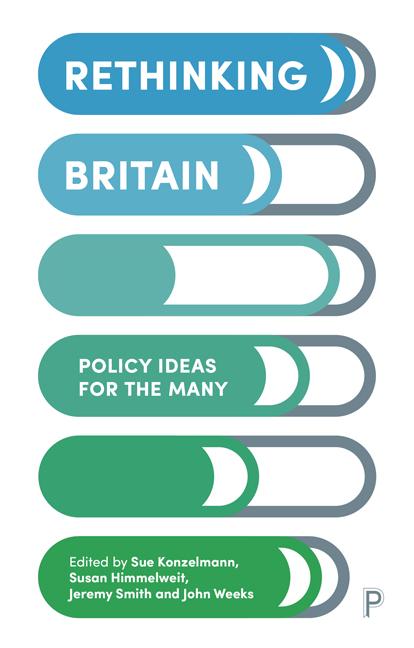Book contents
- Frontmatter
- Contents
- List of Tables and Figures
- The Contributors
- Foreword
- Introduction
- Interlude: ‘Mirror, Mirror, On the Wall – Who has the Highest Debt of All?’
- Part One Building a Full-Employment Economy: Introduction
- Part Two Public Investment – Prioritising Society Rather than Profit: Introduction
- Part Three Making Finance Work for Society: Introduction
- Part Four Genuine Social Security: Introduction
- Part Five How to provide for Social Needs: Introduction
- Conclusion
- Jargon Busters
- References and Further Reading
- Index
1 - When is Austerity an Appropriate Economic Policy?
Published online by Cambridge University Press: 11 March 2021
- Frontmatter
- Contents
- List of Tables and Figures
- The Contributors
- Foreword
- Introduction
- Interlude: ‘Mirror, Mirror, On the Wall – Who has the Highest Debt of All?’
- Part One Building a Full-Employment Economy: Introduction
- Part Two Public Investment – Prioritising Society Rather than Profit: Introduction
- Part Three Making Finance Work for Society: Introduction
- Part Four Genuine Social Security: Introduction
- Part Five How to provide for Social Needs: Introduction
- Conclusion
- Jargon Busters
- References and Further Reading
- Index
Summary
What's the issue?
The results of the consistent application of austerity policies – cuts in public expenditure and/or increased taxation – since the Conservative-led coalition government came to power in 2010 do not make for encouraging reading. Although politicians have claimed that austerity means ‘living within our means’, the reality for the vast majority of British citizens is very different.
Not only have critical public services been either withdrawn or severely limited by the progressive removal of social protections, both GDP and wage growth have also been constrained. Austerity has also failed to deliver its stated objectives – of rapidly reducing and then eliminating the government's deficit (the difference between its annual expenditures and revenues) and national debt (the accumulation of any previous deficits and interest charges plus the current year's deficit).
But the fundamental question isn't whether austerity is a ‘good’ or ‘bad’ policy. Rather, it is whether austerity is an appropriate policy, given a particular economic situation.
When is austerity an appropriate economic policy?
Analysis
Eight years after the turn to austerity in 2010, the UK's recovery from the recession, precipitated by the 2008 financial crisis, is its slowest in recorded history. The government's initial response was to rescue financial institutions deemed ‘too big to fail’ and engage in emergency fiscal and monetary stimulus, and by 2010, a weak recovery was underway, with GDP returning to growth of 1.7 per cent. But concerns about rising government deficits (which increased from 2.6 per cent of GDP in 2007 to 10.1 per cent in 2009) and high levels of public debt (which, during the same period, had risen from 41.9 to 64.1 per cent of GDP) caused an apparent sharp reversal in policy. ‘Apparent’ because, although the word hadn't yet been popularised, austerity has been the policy of all Tory governments since 1979.
The Greek sovereign debt crisis served as the catalyst for austerity in the European Union (EU). In the UK, although the government's deficits and public debt were a direct result of the bank bailouts and emergency stimulus measures, the crisis was redefined as a ‘crisis of debt’; it was (falsely) alleged that high levels of public deficits and debt were the result of excessive government spending.
- Type
- Chapter
- Information
- Rethinking BritainPolicy Ideas for the Many, pp. 13 - 18Publisher: Bristol University PressPrint publication year: 2019



